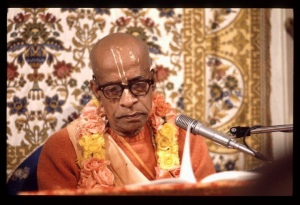SB 3.23.54: Difference between revisions
No edit summary |
(Vanibot #0054 edit - transform synonyms into clickable links, which search similar occurrences) |
||
| Line 23: | Line 23: | ||
<div class="synonyms"> | <div class="synonyms"> | ||
''indriya-artheṣu'' | ''[//vanipedia.org/wiki/Special:VaniSearch?s=indriya&tab=syno_o&ds=1 indriya]-[//vanipedia.org/wiki/Special:VaniSearch?s=artheṣu&tab=syno_o&ds=1 artheṣu]'' — to sense gratification; ''[//vanipedia.org/wiki/Special:VaniSearch?s=sajjantyā&tab=syno_o&ds=1 sajjantyā]'' — being attached; ''[//vanipedia.org/wiki/Special:VaniSearch?s=prasaṅgaḥ&tab=syno_o&ds=1 prasaṅgaḥ]'' — affinity; ''[//vanipedia.org/wiki/Special:VaniSearch?s=tvayi&tab=syno_o&ds=1 tvayi]'' — for you; ''[//vanipedia.org/wiki/Special:VaniSearch?s=me&tab=syno_o&ds=1 me]'' — by me; ''[//vanipedia.org/wiki/Special:VaniSearch?s=kṛtaḥ&tab=syno_o&ds=1 kṛtaḥ]'' — was done; ''[//vanipedia.org/wiki/Special:VaniSearch?s=ajānantyā&tab=syno_o&ds=1 ajānantyā]'' — not knowing; ''[//vanipedia.org/wiki/Special:VaniSearch?s=param&tab=syno_o&ds=1 param] [//vanipedia.org/wiki/Special:VaniSearch?s=bhāvam&tab=syno_o&ds=1 bhāvam]'' — your transcendent situation; ''[//vanipedia.org/wiki/Special:VaniSearch?s=tathā&tab=syno_o&ds=1 tathā] [//vanipedia.org/wiki/Special:VaniSearch?s=api&tab=syno_o&ds=1 api]'' — nonetheless; ''[//vanipedia.org/wiki/Special:VaniSearch?s=astu&tab=syno_o&ds=1 astu]'' — let it be; ''[//vanipedia.org/wiki/Special:VaniSearch?s=abhayāya&tab=syno_o&ds=1 abhayāya]'' — for fearlessness; ''[//vanipedia.org/wiki/Special:VaniSearch?s=me&tab=syno_o&ds=1 me]'' — my. | ||
</div> | </div> | ||
Latest revision as of 21:44, 17 February 2024

A.C. Bhaktivedanta Swami Prabhupada
TEXT 54
- indriyārtheṣu sajjantyā
- prasaṅgas tvayi me kṛtaḥ
- ajānantyā paraṁ bhāvaṁ
- tathāpy astv abhayāya me
SYNONYMS
indriya-artheṣu — to sense gratification; sajjantyā — being attached; prasaṅgaḥ — affinity; tvayi — for you; me — by me; kṛtaḥ — was done; ajānantyā — not knowing; param bhāvam — your transcendent situation; tathā api — nonetheless; astu — let it be; abhayāya — for fearlessness; me — my.
TRANSLATION
Not knowing your transcendental situation, I have loved you while remaining attached to the objects of the senses. Nonetheless, let the affinity I have developed for you rid me of all fear.
PURPORT
Devahūti is lamenting her position. As a woman, she had to love someone. Somehow or other, she came to love Kardama Muni, but without knowing of his spiritual advancement. Kardama Muni could understand Devahūti's heart; generally all women desire material enjoyment. They are called less intelligent because they are mostly prone to material enjoyment. Devahūti laments because her husband had given her the best kind of material enjoyment, but she did not know that he was so advanced in spiritual realization. Her plea was that even though she did not know the glories of her great husband, because she had taken shelter of him she must be delivered from material entanglement. Association with a great personality is most important. In Caitanya-caritāmṛta Lord Caitanya says that sādhu-saṅga (CC Madhya 22.83), the association of a great saintly person, is very important, because even if one is not advanced in knowledge, simply by association with a great saintly person one can immediately make considerable advancement in spiritual life. As a woman, as an ordinary wife, Devahūti became attached to Kardama Muni in order to satisfy her sense enjoyment and other material necessities, but actually she associated with a great personality. Now she understood this, and she wanted to utilize the advantage of the association of her great husband.